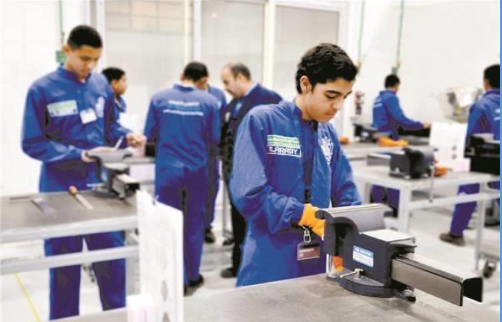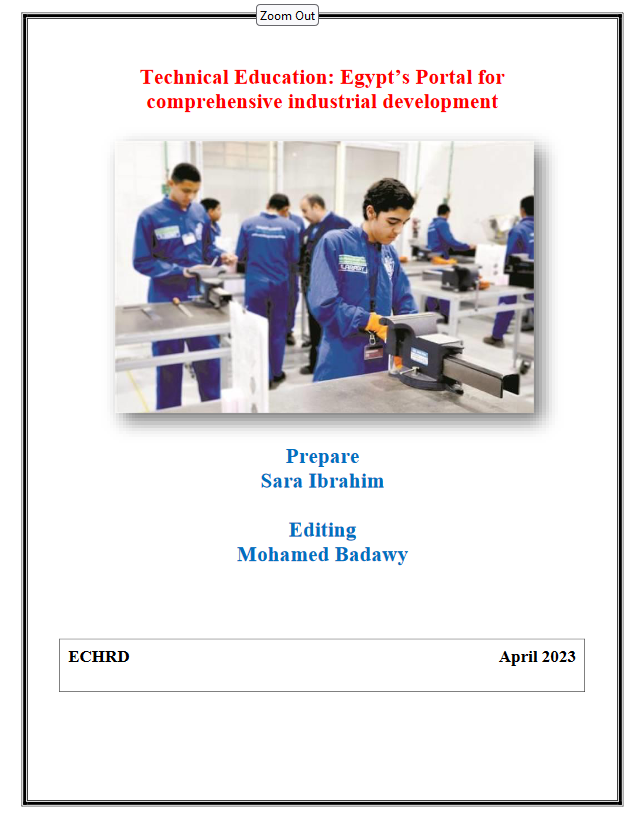Press Release
…………………………………………………………………….
On Wednesday, 26/4/2023, Egyptian Coalition for Human Rights and Development issues its report “Technical Education: Egypt’s Portal for comprehensive industrial development”, which addresses all topic related to technical education and its relationship with comprehensive industrial development, especially at the Egyptian level, through some axes, which are:
- Definition of Technical or Vocational education.
- The Importance of Technical education.
- The most important fields of technical education.
- Challenges facing technical education.
- Technical Education Schools in Egypt.
- The Objectives of technical education in light of Egypt’s Vision 2030.
- The relationship between technical education and industrial development.
- The Egyptian efforts towards technical education and industrial development.
The report pointed out that investment in developing the technical education would encourage students to join this type of education, and raise level of its graduates in order to meet the needs of the labor market of skilled labor that helps in developing the economy and competition at the regional and international level. Moreover, it limits the entry into the labor market of large numbers of education outputs that are unqualified and unskilled, leading to a relative decline in competitiveness in the global economy. The Egyptian experience over the past few years after the 30 June 2013 revolution revealed serious attempts by the Egyptian governments that have since held power to emphasize the link between education and national industry.
In addition, the report explained that the importance of technical education lies in: Focus on specialization- lower cost- smaller class sizes- combination between practical and theoretical education- direct qualification for the labor market- the unemployment rate among technical education student is much lower than University graduates.
It noted that technical education faces many challenges that affect the quality of its outputs and impede the achievement of its goals. These challenges can be classified into several areas: (curricula and study plans- professional development of teachers- administration and management- financing for the vocational education- places and equipment- society’s vision towards vocational education).
In the next decade, Egypt is expected to become a prestigious and prominent place on the world’s industrial map, as the Egyptian State has sought through launching two technology education experiments: the experience of specialized vocational training centers: and the experience of the Ministry of Education in the so-called technological technical schools.
The report concluded with a set of recommendations represented in the following:
- Establishing a central body that acts as an umbrella to support industrial technical education projects, and this body enjoys full independence, as it reports to the Council of Ministers and is chaired by the Minister of Education and Technical Education.
- Develop an urgent national plan to raise the performance of the current level of technical education, taking into account the priority of bridging the deficit in the number of teachers needed for the current schools, by involving universities and the industrial sector to prepare them in a specific period.
- Establishing committees and workshops under the supervision of the Ministry of Education, in cooperation with other relevant ministries, with the aim of identifying the competencies and skills that technical education students must acquire, in order to prepare them to be skilled technical cadres capable of integrating into the labor market.
- Making a map that includes vocational training centers in all governorates, the location of each center, as well as the nearby industrial secondary schools, and the specializations that exist in these centers, to determine the possibility of benefiting from them in training students of industrial schools.
- Assigning agricultural education to faculties of agriculture and agricultural research centers, provided that agreements are made with the Ministry of Agriculture and agricultural companies, and focusing on the practical aspect and agricultural mechanization.
- Assigning commercial education to the faculties of commerce, through the concluding of training and operating agreements with the Ministry of Commerce and commercial companies with continuous training, and assigning tourism and hotel education to the faculties of tourism and hotels. Through these agreements, the required numbers are determined in each technical specialization, in a way that provides job opportunities for graduates, with continuous training for each governorate of the Republic established for this school.
- Transforming technical schools into educational production units that serve the community, provide opportunities for Egyptian workers to improve their skill, artistic and cultural levels, and create a new generation of trained workers capable of joining the labor market directly.
- The enrollment of students in one of the types of technical education is not limited to the total grades in the certificate of completion of the basic education stage, but rather by measuring the tendencies of students to the quality of education, they wish to enroll.
- Asking students to conduct a graduation project at the individual and group levels, so that students acquire many knowledge, skills and desirable characteristics suitable for the needs of the labor market.
- Paying attention to summer training during the school year vacation in technical education schools, and focusing on environmental crafts and industries, through which raw materials and products available in the surrounding environment can be used.
- The contribution of all ministries and authorities concerned with industry in raising awareness of the technological incubators affiliated with the importance of training, raising skills and increasing links with industrial technical education schools, which helps to provide skilled graduates in the labor market.








